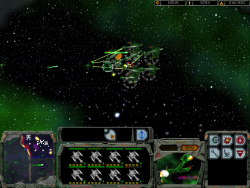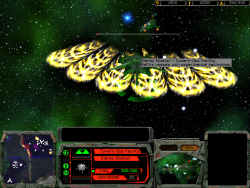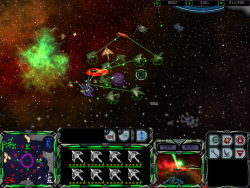Table of Contents
Star Trek: Armada
Info
- Internet play: via VPN
- LAN play: yes
- Lobby search: yes
- Direct IP: no
- Play via Gameranger: yes
- Coop: yes
- Singleplayer campaign: yes
- Hotseat: no
Overview
Armada is a real time strategy game in which you build fleets of starships, research weapon systems and all that for four different parties, but without a complicated economy, such as in Stronghold Crusader. In particular the special weapons offer a rich strategic moment. Basically, it's all about overpowering the enemy with good attack tactics and a good selection of special weapons. In multiplayer, however, you quickly notice that macro management also contributes a lot to who wins and who doesn't.
The game was developed by Activision and also released by them on 22nd of March 2000. It is actually the last game being developed by Activision itself. After Star Trek: Armada Activision did not develop own games any longer, working only as publisher. The game got a re-release on GOG on 13th of December 2021. It is based on an altered engine derived from the engine of Battlezone, the Storm3D engine. Text files from the game also reference Dark Reign: The Future of War, which suggests at least a partial inheritance from this game, too.
The storyline starts after the Dominion War and covers the four factions Borg, Federation, Klingons and Romulans. While the first tries to assimilate the Alpha Quadrant (and take possession of the Omega particle), the Federation fights against those very attempts. The Romulans also have an interest in the Omega particle. The Klingons, on the other hand, are driven by Toral, who tries to install himself as ruler of the Klingon Empire with the help of a fake Sword of Kahless.
[ Star Trek: Armada ] [ Game Play ] [ Technical Support ]
[ Units ] [ Hero Ships ] [ Ship Types ] [ Stations ] [ Station Types ] [ Special Weapons ] [ Factions ] [ Modding ]
System Requirements
The installer mentions the following minimum system requirements:
- 32 MB RAM,
- 50 MB Swap Space,
- 4 MB Video RAM.
Game Play
See Game Play on the subject.
Purchasing
After a law suit Star Trek games from Activision were no longer distributed for quite some time. In the meantime GOG re-released it, so the game is once again legally obtainable from a retailer.
Installation
This section focuses on the GOG version of the game (as this is probably the prefered version today) on modern Windows. If you want to know how to get the CD version to run or wanna use the GOG version on older Windows versions, have a look at the installation article.
The GOG Installer
The game is installable comfortably with the GOG installer on any Windows from XP on. You should not encounter any problems with the actual installation. Once the installation is completed, you will not need a CD or any other kind of system to prove you have the original game. So once installed, you are always already good to go.
Be aware: The GOG version 1.2 is not compatible with the CD version 1.2. So just from comparing version strings you cannot see if all players have compatible versions. See section Hashes of the Different Versions for a comparison of the binary hashes.
The re-release from GOG is not just a simple copy of the old game. They did fix some problems with the original game and added some tools for tweaking and IPX play. It comes only in the English localization, but differs not in game contents. The game already comes declared as version 1.2 (although some of the fixes certainly would have allowed for an increase of that number to 1.2.1). The GOG version original only allows for 4:3 resolutions up to 1600×1200. The GOG version works well without any additional steps to be taken, except maybe applying the 1.3 patch (adds widescreen support). See next section on that.
Patch 1.3
The patch to version 1.3 actually only consists of one file, WonInterface.dll. This file replaces the original one. Once you replace the original file with the patched version, the game will declare itself as version 1.3 and allow for a lot of additional resolutions to be set in the graphics settings. The patch also adds an in-game editor mode switch (typing edit in the chat will activate it, but that requires the map editor files). Too long PATH variables and too much RAM will also not be an issue any longer.
Be aware, that the selection menu for the available resolutions now behaves a little bit different. To fit in the additional resolutions, the menu items are packed together closer, which makes them overlap with one another a bit. This leads to the strange behavior, that the menu items can only be selected properly, when hovering in the upper half of a menu item. You can clearly see, if 1.3 was applied in this menu, because the item labels (e.g. 1920x1080x32) are displayed in the upper half of each selection item box.
The patch installer will not find the GOG installation folder by itself (different registry key are used for that information, than used to be used for the CD version), so you will have to pick the folder manually.
You can find the 1.3 patch here.
Hashes of the Different Versions
As written above, different versions of the game will not find one another on the network, as they check the Armada.exe (and some other files) for compatibility. In order to see what version you have, you can check for the MD5 or SHA1 checksums. These come directly from original versions of Star Trek: Armada:
| Version | MD5 | SHA1 |
|---|---|---|
| CD 1.1 | 65C1CF851729C4551C68566E541760B8 | 4DD242EB9FE1234B9FCD769A904497FCDDCCB453 |
| CD 1.2 | 882F958F5E57C33A89E246F92FD8E3BC | 7CDC9E1DE94AC6DF32325DBDCDF98D2B8D964C30 |
| GOG 1.2 | 75E9B46B9765B17B11AE810B781D365A | 8BA398C022A0B68BBA5ECA35F46AFEDAC78E8764 |
Other variations e.g. with some sort of NoCD crack applied, will have different checksums. However, different languages do not seem to have different game files that are checked for compatibility. So a German 1.2 version can be played very well in conjunction with an English version.
Known Problems
There is a number of Known Problems with Armada. Most of them can be solved. If you want to play Armada on Windows XP or Windows 2000, you will definitely want to have a look at them.
Game Improvements
There are several options for improving the game experience. See Tweaking the Game on the matter.
Mods
- Dark Alliance 2: 12 playable races in 4 alliances and some new features
- The Millenium Project: New models, textures, maps, etc., but remains compatible with the single player.
- Star Trek vs. Star Wars Conversion Mod / Re-release for GOG version, adds the New Republic, the Imperial Remnant and the newly established Federation. There are also some scenarios that can be played.
Screen Shots/Windowed Mode
The game makes it a bit difficult to create screen shots under older Windows versions. The Print key works only, once you are in windowed mode or at the score screen at the end of a match. By default, the game is in full screen mode. To switch to windowed mode (or back to full screen mode), press ALT + Enter. This however, only works when in a match or single player mission. Once you are in windowed mode, you can safely end the match and get to the menu. As long as you are in windowed mode, you can use the Print key and insert the taken screen shot into your favorite graphics editor.
On modern Windows systems ALT + WIN + PRINT will make a screenshot with the Xbox Game Bar functionality. This however won't work in the menus. The resulting screenshot will be a black rectangle, not contents aside from that. This also goes for the score screen at the end of a match.
The functionality mentioned in the manual (CTRL + ALT + Z) apparently does not always work reliably. Depending on your keyboard layout it may be different (e.g. on a German keyboard it is CTRL + ALT + Y).
Web links
- Armadafleetcommand, a page with many mods and other files for Armada
- Star Trek Armada @ Calrissian.com, a real retro page concerning Armada 1 & 2.
Network
General Information
See also Setting Up Matches on more details.
LAN/VPN Play
The game uses DirectPlay for communications. Be sure to open those ports on all players computers, as the game is Peer to Peer.
If you want to limit the forwarding to only a handful of ports, then it might suffice to open ports 2300 and 47624 (TCP) as well as 2350 (UDP). Tests with Wireshark suggest, that these ports are the only three, that are actually required to be forwarded (unconfirmed). They are used by all involved players.
IPX
Similar to the already mentioned TCP/IP connection, via LAN/VPN IPX is also an option. And, when using an IPX server, not even a VPN is required. For more details on how to set up an IPX connection, see Using IPX.
Gameranger
For GameRanger it is sufficient to forward port 16000 (UDP) only.
Former WON Network (Obsolete)
The game offers only the WON servers for the Internet game (not available any longer) and in the LAN it searches automatically for open servers, using DirectPlay. Unfortunately it is not possible to enter an IP address. This requires LAN games, games via VPN, or via Gameranger. The port forwarding for routers below makes little sense, apart from GameRanger. Known ports that the game used at some point:
So it doesn't seem to be just the DirectPlay area that is used, but something more.
GOG vs. CD Version
The game checks its own binary file (Armada.exe) before entering multiplayer menus. Only games with the same checksum will find each other on the network. That is the reason why the original CD version cannot find GOG matches and the other way around. Also cracks and other altering of the binary will require having the same alterations present at all players sides.
The CD version is known to be rather unstable on network play. Frequent desyncs are not unheard of. The GOG version also suffers from those problems, but apparently to a far lesser extend. Also the GOG version comes with an IPX wrapper, that allows IPX network play via UDP. Both have a tendency for descyncs, so it does not really matter if you use IPX or UDP.




